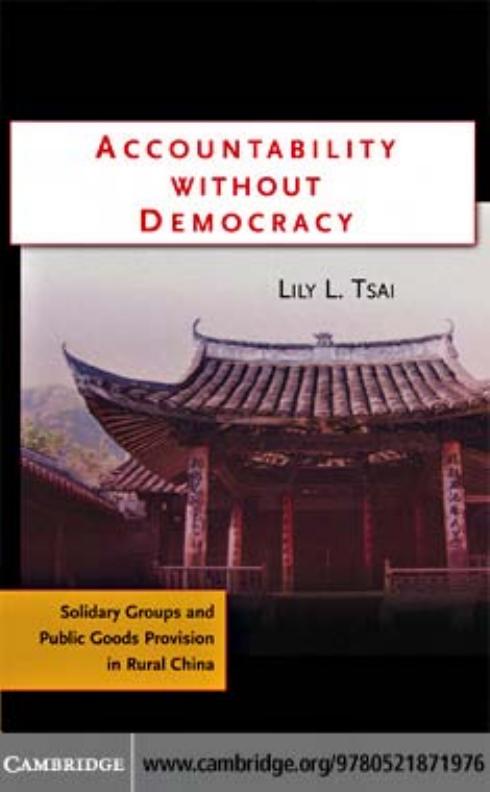Accountability Without Democracy Solidary Groups and Public Goods Provision in Rural China 1st edititon by LILY L TSAI ISBN 0521692806 978-0521692809
$70.00 Original price was: $70.00.$35.00Current price is: $35.00.
Instant download Accountability Without Democracy Solidary Groups and Public Goods Provision in Rural China LILY L. TSAI after payment
Accountability Without Democracy Solidary Groups and Public Goods Provision in Rural China 1st edititon by LILY L. TSAI- Ebook PDF Instant Download/Delivery: 0521692806 978-0521692809
Full download Accountability Without Democracy Solidary Groups and Public Goods Provision in Rural China 1st edititon after payment

Product details:
ISBN 10: 0521692806
ISBN 13: 978-0521692809
Author: LILY L. TSAI
This book examines the fundamental issue of how citizens get government officials to provide them with the roads, schools, and other public services they need by studying communities in rural China. In authoritarian and transitional systems, formal institutions for holding government officials accountable are often weak. The answer, Lily L. Tsai found, lies in a community’s social institutions. Even when formal democratic and bureaucratic institutions of accountability are weak, government officials can still be subject to informal rules and norms created by community solidary groups that have earned high moral standing in the community.
Accountability Without Democracy Solidary Groups and Public Goods Provision in Rural China 1st Table of contents:
1 Governance and Informal Institutions of Accountability
Local Governance and Public Goods Provision
Explaining the Performance of Local Governments
Solidary Groups and Informal Accountability
Overview of the Book
Data
2 Decentralization and Local Governmental Performance
The Basic Structure of Village Government
The Provision of Local Public Goods in Rural China
Decentralization and the Provision of Local Public Goods
Unfunded Mandates and Informal Institutions of Local Public Finance
Informal Institutions of Public Finance at the Village Level
Reassessing Decentralization
A Darker Picture of Decentralization
Decentralization and Local Governmental Debt
Bureaucratic Inflation and Corruption
Conclusion
3 Local Governmental Performance: ASSESSING VILLAGE PUBLIC GOODS PROVISION
Rural Public Goods Provision in Historical Perspective
Roads
Rural Education
Rural Water Provision
Measuring Village Governmental Provision of Public Goods
Variation in Village Governmental Provision of Public Goods
Village Government Investment in Public Projects
Roads and Paths
Village School Facilities
Village Water Delivery
Public Goods Provision and Economic Development
Findings from the Survey
Provincial-Level Variation
Understanding Local Governmental Public Goods Provision in Rural China
4 Informal Accountability and the Structure of Solidary Groups
The Benefits of Moral Standing
The Awarding of Moral Standing
Encompassing and Embedding Solidary Groups
Moral Standing as Political Leverage
Solidary Groups in Rural China
Solidary Groups in the Early Twentieth Century
Solidary Groups in the Maoist Period
Solidary Groups and Rural Governance in the Reform Period
Moral Standing as a Political Resource for Local Officials
Moral Standing as a Political Resource for Citizens
The Awarding of Moral Authority
Shared Moral Obligations and Ethical Standards
Public Fulfillment of Obligations and Conferral of Moral Standing
Conclusion
5 Temples and Churches in Rural China
The Structure of Temples and Churches in Rural China
Findings from the Survey Data
Measuring the Dependent Variable
Measuring the Explanatory Variable
Control Variables
Analysis and Findings
Villages with Both Temples and Churches
Village Case Studies
Case 1: West Gate Village – Temple Councils and Moral Authority
Case 2: Yang Hamlet – Temple Festival Associations and Moral Authority
Case 3: South Bend Village – Church Institutions Substituting for Village Government
Conclusion
6 Lineages and Local Governance
Lineage Groups in Rural China
Findings from the Survey Data
Measuring the Explanatory Variable
Analysis and Findings
Villages with Multiple Types of Solidary Groups
Causal Mechanisms
Evaluating Alternative Causal Mechanisms
Informal Accountability and Confidence in Officials
Structured Comparison of Case Studies
Villagewide Lineage Groups and Governmental Performance
Subvillage Lineage Institutions and Governmental Performance
Intervillage Lineage Institutions
Conclusion
7 Accountability and Village Democratic Reforms
Grassroots Democratic Reforms in Rural China
The Case of River Bridge Village
Structured Comparisons of Case Studies
Fujian Village Case Studies: River Bridge and West Gate
Hebei Village Case Studies: Yang Hamlet and South Bend
Jiangxi Village Case Studies: High Mountain and Li Settlement
Measuring the Implementation of Democratic Institutions
Preelection Institutions
Voting Institutions
Villagers’ Representative Assemblies
Measuring Democratic Institutions in Multiple Ways
Analysis and Findings
Looking at Preelection, Voting, and Representative Assemblies Separately
Interactions between Village Democratic Institutions and Village Solidary Groups
The Limitations of Village Democratic Reforms
Lack of Leverage
Lack of Information
Elections and Civic Values
Conclusion
8 The Limitations of Formal Party and Bureaucratic Institutions
Formal Accountability at the Village Level
Formal Party Institutions of Accountability
Formal Bureaucratic Institutions of Accountability
The Limitations of Top-Down Control
Decentralization and Lack of Leverage
Decentralization and Lack of Incentives
Lack of Information
Findings from the Survey
Party Institutions of Accountability
Bureaucratic Institutions of Accountability
Conclusion
9 Conclusion
Findings
Informal Institutions and Governmental Performance
Informal Accountability and the Structure of Social Groups
Informal Accountability and Political Transitions
Understanding Governance and Development
People also search for Accountability Without Democracy Solidary Groups and Public Goods Provision in Rural China 1st:
how democracy is accountable responsive and legitimate government
what is accountability in democracy
democratic government in practice are known as accountable
accountability democracy
accountability without shame
Tags:
LILY L TSAI,Accountability Without,Public Goods


